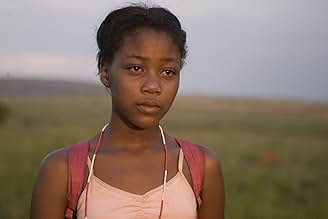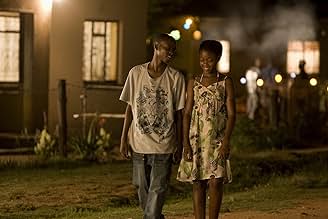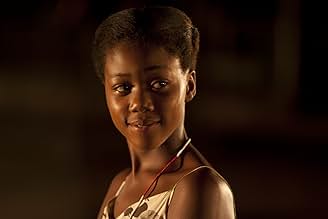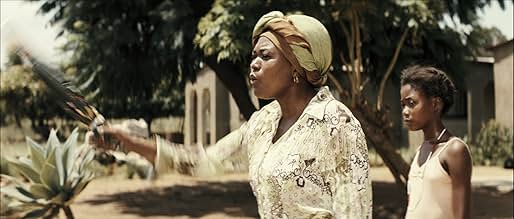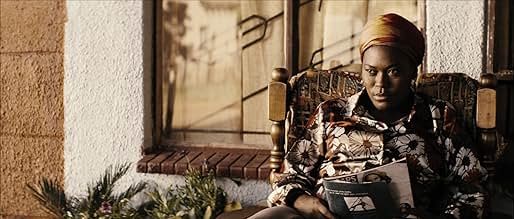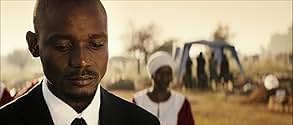IMDb RATING
7.1/10
1.5K
YOUR RATING
A touching mother-daughter relationship that reflects the modern South Africa.A touching mother-daughter relationship that reflects the modern South Africa.A touching mother-daughter relationship that reflects the modern South Africa.
- Director
- Writers
- Stars
- Awards
- 13 wins & 10 nominations total
Harriet Lenabe
- Mrs. Tafa
- (as Harriet Manamela)
- Director
- Writers
- All cast & crew
- Production, box office & more at IMDbPro
7.11.5K
1
2
3
4
5
6
7
8
9
10
Featured reviews
10Red-125
Life, Above All is a brilliant film
Le secret de Chanda (2010)
The South African/German film Le secret de Chanda was shown in the U.S. with the title, Life, Above All (2010). It was co-written and directed by Oliver Schmitz.
The movie stars Khomotso Manyaka as Chanda, a young woman trying to hold her own in a South African township. Her father is dead, her stepfather is feckless, her mother is sick, and she has two half-siblings about whom she worries.
Manyaka is a brilliant actor. Without a superb performance from her, the film could not have been so successful. Her role--and her skill--reminded me of Jennifer Lawrence in Winter's Bone. She's beset on all sides, but she refuses to give up.
Many of Chanda's problems arise from the fact that saving face is more important than almost anything else.
We saw this movie at Rochester's wonderful Dryden Theatre in the George Eastman Museum. It will work well on the small screen as well. It's a great movie-don't miss it!
The movie stars Khomotso Manyaka as Chanda, a young woman trying to hold her own in a South African township. Her father is dead, her stepfather is feckless, her mother is sick, and she has two half-siblings about whom she worries.
Manyaka is a brilliant actor. Without a superb performance from her, the film could not have been so successful. Her role--and her skill--reminded me of Jennifer Lawrence in Winter's Bone. She's beset on all sides, but she refuses to give up.
Many of Chanda's problems arise from the fact that saving face is more important than almost anything else.
We saw this movie at Rochester's wonderful Dryden Theatre in the George Eastman Museum. It will work well on the small screen as well. It's a great movie-don't miss it!
7OJT
Heartful social drama from suburban South Africa
I've been quite surprised if the quality of South African films from the latter years, and this is another example of this quality. And a South African film isn't only Dustrict 9 or Vehicle 19, which both were great, but also film like this little gem, based on the novel "Chanda's secrets" by Canadian Allan Stratton, and directed by the German director Oliver Schmitz, which is born in Cape Town, S.A.
Young Chanda, 12, is checking out the funeral for her little sister Sarah, which have suddenly died, getting to know that the money the mother kept has been stolen. Her father is an irresponsible drunk, and she realizes that her friend is selling services as a prostitute to the lorry drivers down town. Chanda begins to understand a lot about how the world functions. We get to see Chanda's poor neighborhood in Elandsdoorn outside of Johannesburg. Her mother turns ill just after, making even more challenges for Chanda, amongst them a lot of rumors and superstition. A superstition that adds deeply to the challenges in such a poor community.
The film was chosen for the "Un certain regard"-program under the Cannes Festival, very deservedly. I haven't read the novel, but I understand the film makes a good job, though having to let out some if the film to make a film out of it. Fine cinematography work, with great use of light focusing, and great job fond by the actors, makes this a very see-worthy film. It depicts the challenges which might occur in every society, but also the ones hitting especially hard in a poor neighborhood.
It's a beak realistically told film, even if it's a fictional tale. Still the film is not without hope. Chanda makes a big difference in her neighborhood, with her heart and sense of getting things right.
Young Chanda, 12, is checking out the funeral for her little sister Sarah, which have suddenly died, getting to know that the money the mother kept has been stolen. Her father is an irresponsible drunk, and she realizes that her friend is selling services as a prostitute to the lorry drivers down town. Chanda begins to understand a lot about how the world functions. We get to see Chanda's poor neighborhood in Elandsdoorn outside of Johannesburg. Her mother turns ill just after, making even more challenges for Chanda, amongst them a lot of rumors and superstition. A superstition that adds deeply to the challenges in such a poor community.
The film was chosen for the "Un certain regard"-program under the Cannes Festival, very deservedly. I haven't read the novel, but I understand the film makes a good job, though having to let out some if the film to make a film out of it. Fine cinematography work, with great use of light focusing, and great job fond by the actors, makes this a very see-worthy film. It depicts the challenges which might occur in every society, but also the ones hitting especially hard in a poor neighborhood.
It's a beak realistically told film, even if it's a fictional tale. Still the film is not without hope. Chanda makes a big difference in her neighborhood, with her heart and sense of getting things right.
African women
Oliver Schmitz, the German director has a panache for telling socially relevant stories about South Africa. In the hey days of the apartheid years he made the classic and iconic Mapantsula which through its lead character Panic, a petty criminal, the international world was able to see how bad the system is through Panic's story of political consciousness been awaken by events happening around him. In the 90's he made a post apartheid film Hi-Jack stories;it did not fare that well but touched on lure of gangsterism, hijacking and criminal behavior in the new South Africa. It's very poignant in the post Madiba- post Mbeki years and in the year of the Zuma presidency that Schmitz tackles the thorny issue of the shame that is associated with HIV/AIDS and the burden of child headed families due to this epidemic. Although immediately one would like to associate Life,above all with Yesterday but Life above all is a cut above Yesterday .It feels more sincere, touching and less whimsical than Yesterday, although the films are both set in the rural areas, both use vernacular and deal with stigmatization. I think the choice to tell the story from the child's perspective in Life, Above All is refreshing and the film actually feels more contemporary than Yesterday.
The child in question here is Khomotso Manyaka who plays Chanda; the eldest daughter in her family who has to act as a glue to hold the film and the family together as they go through trying times. Half the cast of the film have not appeared in anything before, and some of the cast are none actors ,so the performances are not always strong but they are always heart felt. Khomotso does a lot of heavy lifting and one hopes her career does not start and end here but keeps growing; for she is able to emote well and gives Chanda that naivety and tenacity at all the right moments. Then there's the evergreen Lerato Mvelase as Chanda's mother Lilian; Lerato gives Lilian that grace that a mother would have, although at times I felt she was a bit too young to have a child of Chandas age but her performance is that great that one easily overlooks that conceit. Then there's Harriet Lanabe as Mrs. Tafa; who if there was any justice in this world would be getting local awards for her performance in this role. She's brilliant; she inhibits this woman's character so well that one cannot distinguish between the character and the actor. There are plenty of acting talent in this film The film benefits for having evenly structured multi-stories were all the major characters have their journeys and we get to follow them to the end. So its not just about the messaging but there is a story that one can immerse themselves in. The powerful thing about this story is that it keeps bringing you back to our own reality and makes one ponder about one or two things as you are watching it.
What I liked about Life, Above All is that it shows that shame factor actually does not help the situation. Shaming people and trying to put them down and ostracizing them does not sort the problem but just makes it bigger and this can be said not just for HIV/AIDS but for homosexuality,criminal behavior or any social or familial problem. It is through Chanda's uncompromising love that we see a way out of the virtuous cycle of shame and guilt. This movie ain't easy to watch but it's not a bleak movie at all. Shcmitz captures the tone of the rural life very well, from costume, to weather to iconography but above all he is able to capture the idea of a community. How communities work ,the good,the bad and the darn ugly of communities but above all what communities can do together to uplift and not just to tear down. Do yourself a favor and watch this one, it's a classic in the making, a story about us on the big screen catching it while its there.
The child in question here is Khomotso Manyaka who plays Chanda; the eldest daughter in her family who has to act as a glue to hold the film and the family together as they go through trying times. Half the cast of the film have not appeared in anything before, and some of the cast are none actors ,so the performances are not always strong but they are always heart felt. Khomotso does a lot of heavy lifting and one hopes her career does not start and end here but keeps growing; for she is able to emote well and gives Chanda that naivety and tenacity at all the right moments. Then there's the evergreen Lerato Mvelase as Chanda's mother Lilian; Lerato gives Lilian that grace that a mother would have, although at times I felt she was a bit too young to have a child of Chandas age but her performance is that great that one easily overlooks that conceit. Then there's Harriet Lanabe as Mrs. Tafa; who if there was any justice in this world would be getting local awards for her performance in this role. She's brilliant; she inhibits this woman's character so well that one cannot distinguish between the character and the actor. There are plenty of acting talent in this film The film benefits for having evenly structured multi-stories were all the major characters have their journeys and we get to follow them to the end. So its not just about the messaging but there is a story that one can immerse themselves in. The powerful thing about this story is that it keeps bringing you back to our own reality and makes one ponder about one or two things as you are watching it.
What I liked about Life, Above All is that it shows that shame factor actually does not help the situation. Shaming people and trying to put them down and ostracizing them does not sort the problem but just makes it bigger and this can be said not just for HIV/AIDS but for homosexuality,criminal behavior or any social or familial problem. It is through Chanda's uncompromising love that we see a way out of the virtuous cycle of shame and guilt. This movie ain't easy to watch but it's not a bleak movie at all. Shcmitz captures the tone of the rural life very well, from costume, to weather to iconography but above all he is able to capture the idea of a community. How communities work ,the good,the bad and the darn ugly of communities but above all what communities can do together to uplift and not just to tear down. Do yourself a favor and watch this one, it's a classic in the making, a story about us on the big screen catching it while its there.
Initially Slack But Ultimately Deeply Moving Drama
It takes quite a while for the central conflict (and hence themes) to emerge in this story of a 12-year old African girl and her family. For a while, it seems to be one of those movies in which the protagonist is challenged by a series of apparently unrelated hardships -- misery for its own sake -- and hence it touches the viewer less than it might. Once the story takes shape, though, it becomes very powerful. It is absolutely worth experiencing the seemingly episodic first half to get to the film's payoff. Recommended, and highly so if you are interested (as I am) in the struggle between the rational, modern worldview and the religious. (7/10 for me, means B+, highly recommended).
A heart touching story about a girls fight to keep her family together
Oliver Schmitz, the German director has a panache for telling socially relevant stories about South Africa. In the hey days of the apartheid years he made the classic and iconic Mapantsula which through its lead character Panic, a petty criminal, the international world was able to see how bad the system is through Panic's story of political consciousness been awaken by events happening around him. In the 90's he made a post apartheid film Hi-Jack stories;it did not fare that well but touched on lure of gangsterism, hijacking and criminal behavior in the new South Africa. It's very poignant in the post Madiba- post Mbeki years and in the year of the Zuma presidency that Schmitz tackles the thorny issue of the shame that is associated with HIV/AIDS and the burden of child headed families due to this epidemic. Although immediately one would like to associate Life,above all with Yesterday but Life above all is a cut above Yesterday .It feels more sincere, touching and less whimsical than Yesterday, although the films are both set in the rural areas, both use vernacular and deal with stigmatization. I think the choice to tell the story from the child's perspective in Life, Above All is refreshing and the film actually feels more contemporary than Yesterday.
The child in question here is Khomotso Manyaka who plays Chanda; the eldest daughter in her family who has to act as a glue to hold the film and the family together as they go through trying times. Half the cast of the film have not appeared in anything before, and some of the cast are none actors ,so the performances are not always strong but they are always heart felt. Khomotso does a lot of heavy lifting and one hopes her career does not start and end here but keeps growing; for she is able to emote well and gives Chanda that naivety and tenacity at all the right moments. Then there's the evergreen Lerato Mvelase as Chanda's mother Lilian; Lerato gives Lilian that grace that a mother would have, although at times I felt she was a bit too young to have a child of Chandas age but her performance is that great that one easily overlooks that conceit. Then there's Harriet Lanabe as Mrs.Tafa; who if there was any justice in this world would be getting local awards for her performance in this role. She's brilliant; she inhibits this woman's character so well that one cannot distinguish between the character and the actor. There are plenty of acting talent in this film The film benefits for having evenly structured multi-stories were all the major characters have their journeys and we get to follow them to the end.So its not just about the messaging but there is a story that one can immerse themselves in.The powerful thing about this story is that it keeps bringing you back to our own reality and makes one ponder about one or two things as you are watching it.
What I liked about Life, Above All is that it shows that shame factor actually does not help the situation. Shaming people and trying to put them down and ostracizing them does not sort the problem but just makes it bigger and this can be said not just for HIV/AIDS but for homosexuality,criminal behavior or any social or familial problem. It is through Chanda's uncompromising love that we see a way out of the virtuous cycle of shame and guilt.This movie ain't easy to watch but it's not a bleak movie at all. Shcmitz captures the tone of the rural life very well, from costume, to weather to iconography but above all he is able to capture the idea of a community. How communities work ,the good,the bad and the darn ugly of communities but above all what communities can do together to uplift and not just to tear down. Do yourself a favor and watch this one, it's a classic in the making, a story about us on the big screen catching it while its there.
The child in question here is Khomotso Manyaka who plays Chanda; the eldest daughter in her family who has to act as a glue to hold the film and the family together as they go through trying times. Half the cast of the film have not appeared in anything before, and some of the cast are none actors ,so the performances are not always strong but they are always heart felt. Khomotso does a lot of heavy lifting and one hopes her career does not start and end here but keeps growing; for she is able to emote well and gives Chanda that naivety and tenacity at all the right moments. Then there's the evergreen Lerato Mvelase as Chanda's mother Lilian; Lerato gives Lilian that grace that a mother would have, although at times I felt she was a bit too young to have a child of Chandas age but her performance is that great that one easily overlooks that conceit. Then there's Harriet Lanabe as Mrs.Tafa; who if there was any justice in this world would be getting local awards for her performance in this role. She's brilliant; she inhibits this woman's character so well that one cannot distinguish between the character and the actor. There are plenty of acting talent in this film The film benefits for having evenly structured multi-stories were all the major characters have their journeys and we get to follow them to the end.So its not just about the messaging but there is a story that one can immerse themselves in.The powerful thing about this story is that it keeps bringing you back to our own reality and makes one ponder about one or two things as you are watching it.
What I liked about Life, Above All is that it shows that shame factor actually does not help the situation. Shaming people and trying to put them down and ostracizing them does not sort the problem but just makes it bigger and this can be said not just for HIV/AIDS but for homosexuality,criminal behavior or any social or familial problem. It is through Chanda's uncompromising love that we see a way out of the virtuous cycle of shame and guilt.This movie ain't easy to watch but it's not a bleak movie at all. Shcmitz captures the tone of the rural life very well, from costume, to weather to iconography but above all he is able to capture the idea of a community. How communities work ,the good,the bad and the darn ugly of communities but above all what communities can do together to uplift and not just to tear down. Do yourself a favor and watch this one, it's a classic in the making, a story about us on the big screen catching it while its there.
Did you know
- TriviaThe film was selected as the South African entry for the Best Foreign Language Film at the 83rd Academy Awards. It was not ultimately nominated but did make the Academy's shortlist.
- ConnectionsFeatured in Maltin on Movies: Harry Potter and the Deathly Hallows: Part 2 (2011)
- How long is Life, Above All?Powered by Alexa
Details
- Release date
- Countries of origin
- Official site
- Language
- Also known as
- 生命的重量
- Filming locations
- Production companies
- See more company credits at IMDbPro
Box office
- Gross US & Canada
- $134,461
- Opening weekend US & Canada
- $13,788
- Jul 17, 2011
- Gross worldwide
- $230,529
- Runtime
- 1h 40m(100 min)
- Color
- Sound mix
- Aspect ratio
- 2.35 : 1
Contribute to this page
Suggest an edit or add missing content







